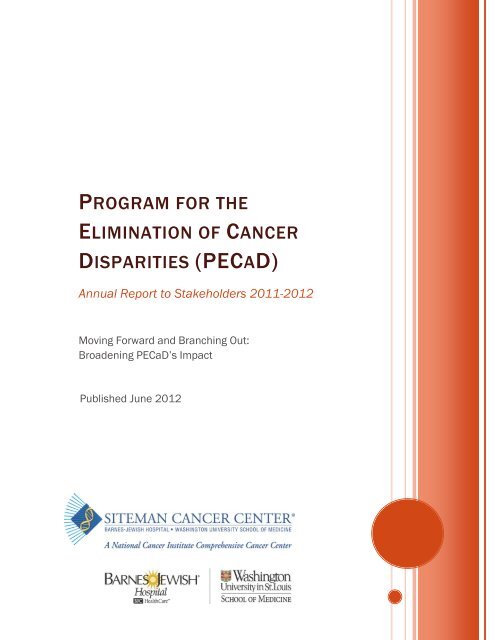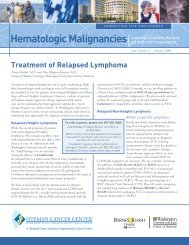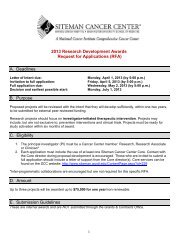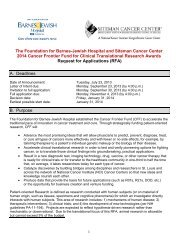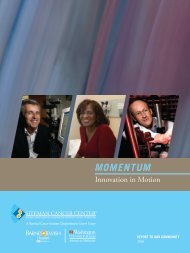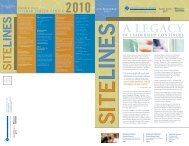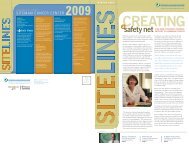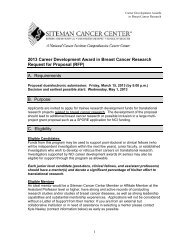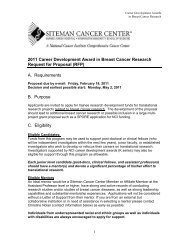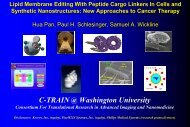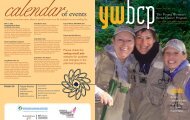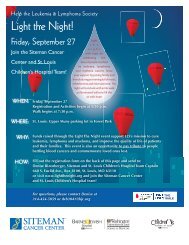Annual Report to Stakeholders 2011-2012 - Siteman Cancer Center ...
Annual Report to Stakeholders 2011-2012 - Siteman Cancer Center ...
Annual Report to Stakeholders 2011-2012 - Siteman Cancer Center ...
You also want an ePaper? Increase the reach of your titles
YUMPU automatically turns print PDFs into web optimized ePapers that Google loves.
PROGRAM FOR THE<br />
ELIMINATION OF CANCER<br />
DISPARITIES (PECAD)<br />
<strong>Annual</strong> <strong>Report</strong> <strong>to</strong> <strong>Stakeholders</strong> <strong>2011</strong>-<strong>2012</strong><br />
Moving Forward and Branching Out:<br />
Broadening PECaD’s Impact<br />
Published June <strong>2012</strong>
TABLE OF CONTENTS<br />
Program for the Elimination of <strong>Cancer</strong> Disparities (PECaD)<br />
About PECaD……………………………………………………………………3<br />
Introduction………….………………………………………………………….5<br />
Leadership Updates………………………………………………………….7<br />
Community Partnership Updates……………………………..……..11<br />
Outreach and Education Updates……………………………………13<br />
Quality Improvement and Research Updates…………….…….21<br />
Training Program Updates……………………………………...………31<br />
Conclusion...……..……………………………………………………………33<br />
2
Program for the Elimination of <strong>Cancer</strong> Disparities (PECaD)<br />
ABOUT THE PROGRAM FOR THE ELIMINATION OF<br />
CANCER DISPARITIES (PECAD)<br />
<strong>Annual</strong> <strong>Report</strong> <strong>to</strong> <strong>Stakeholders</strong><br />
The purpose of this report is <strong>to</strong> provide our stakeholders with a summary of the<br />
progress made <strong>to</strong>ward the elimination of cancer disparities in our region and our<br />
communities. This report provides updates for ongoing work within PECaD from the<br />
beginning of the second grant in September 2010 through April <strong>2012</strong>.<br />
Who We Are<br />
The mission of the <strong>Siteman</strong> <strong>Cancer</strong> <strong>Center</strong>’s Program for the Elimination of <strong>Cancer</strong><br />
Disparities (PECaD) is <strong>to</strong> create a national model for eliminating local and regional<br />
disparities in cancer education, prevention and treatment. Working through a<br />
community advisory committee and cancer site-specific community partnerships,<br />
PECaD develops outreach and education, quality improvement and research, and<br />
training strategies that foster healthy communities and environments less burdened<br />
by cancer disparities.<br />
Program Direc<strong>to</strong>r<br />
PECaD Staff<br />
Graham A. Colditz, MD, DrPH<br />
Niess-Gain Professor, Chief, Division of Public Health Sciences,<br />
Department of Surgery, Washing<strong>to</strong>n University School of Medicine;<br />
Associate Direc<strong>to</strong>r of Prevention and Control, <strong>Siteman</strong> <strong>Cancer</strong><br />
<strong>Center</strong>; and Deputy Direc<strong>to</strong>r, Institute for Public Health at<br />
Washing<strong>to</strong>n University in St. Louis<br />
Vic<strong>to</strong>ria Anwuri, MPH – Project Manager<br />
Jackie Bernstein, MPH – Program Coordina<strong>to</strong>r<br />
Matthew Brown, MPH – Research Study Coordina<strong>to</strong>r<br />
Kimberly Carter, PhD – Research Assistant<br />
Karen Collins, PhD – <strong>Siteman</strong> <strong>Cancer</strong> <strong>Center</strong> Health Behavior, Communication &<br />
Outreach Core, CSO Liaison<br />
3
Sara Figueroa – Public Health Technician<br />
Sierra Johnson, MSW – Program Coordina<strong>to</strong>r<br />
Meera Muthukrishnan, MPH – Research Assistant<br />
Amy Ostendorf – Marketing and Communications<br />
Jewel Stafford, MSW – Liaison from Goodman Lab<br />
Jennifer Tappenden, RHIA – Data Manager<br />
Acknowledgements<br />
Program for the Elimination of <strong>Cancer</strong> Disparities (PECaD)<br />
We wish <strong>to</strong> acknowledge and thank the members of our Disparities Elimination<br />
Advisory Committee, cancer site-specific community partnerships and many<br />
community organizations for their dedication and collaboration <strong>to</strong> eliminate cancer<br />
disparities in our region.<br />
Funding<br />
PECaD is funded by the National <strong>Cancer</strong> Institute at the National Institutes of Health<br />
(U54 CA153460), the Foundation for Barnes-Jewish Hospital, Washing<strong>to</strong>n University<br />
School of Medicine, and the <strong>Siteman</strong> <strong>Cancer</strong> <strong>Center</strong>. PECaD receives additional<br />
funding for specific programs and projects.<br />
4
INTRODUCTION<br />
Program for the Elimination of <strong>Cancer</strong> Disparities (PECaD)<br />
From 1990 <strong>to</strong> 2007, cancer death rates decreased by about 22% in men and 14% in<br />
women, translating <strong>to</strong> the avoidance of 898,000 deaths from cancer. However, not<br />
all segments of the U.S. population have benefited equally from this progress.<br />
<strong>Cancer</strong>-related health disparities remain. For example, death rates in persons with<br />
lower socioeconomic status showed little or no decrease. The decreases in cancer<br />
death rates in minorities were slower compared <strong>to</strong> those of whites. As a result, the<br />
gap in mortality rates between segments of the U.S. population has continued <strong>to</strong><br />
widen. Minorities and people with low socioeconomic status have the highest rates of<br />
both new cancers and cancer deaths.<br />
The Program for the Elimination of <strong>Cancer</strong> Disparities (PECaD) of the <strong>Siteman</strong> <strong>Cancer</strong><br />
<strong>Center</strong> at Barnes-Jewish Hospital and Washing<strong>to</strong>n University School of Medicine was<br />
established in 2003 with institutional funds in response <strong>to</strong> known excess cancer<br />
burden within the region and the state, particularly for minority and medically<br />
underserved populations. We work with community partners <strong>to</strong> develop outreach and<br />
education, quality improvement and research, and training strategies that will foster<br />
healthy communities and environments less burdened by cancer disparities. PECaD<br />
has worked with numerous community organizations and provider groups and has<br />
harnessed resources from national and local funders <strong>to</strong> build and expand<br />
collaborations and strengthen institutional infrastructure <strong>to</strong> address cancer<br />
disparities.<br />
Some progress is being made <strong>to</strong> reduce cancer disparities in Missouri. For example,<br />
the five-year mortality rate in Missouri for all cancer sites fell on average slightly<br />
faster for African Americans than whites (1.6% per year compared <strong>to</strong> 0.8% per year)<br />
from 2004 <strong>to</strong> 2008. This is important because in order <strong>to</strong> show reduction in disparity,<br />
populations that experience the disparity must catch up or outperform the<br />
advancements in the non-disparity population. A similar positive trend was shown for<br />
lung cancer death from the early 1990s <strong>to</strong> 2008 in Missouri. However, smoking rates<br />
have been on the rise recently among minorities, which promises <strong>to</strong> cause excess<br />
lung cancer death and disparity in the future. In the St. Louis region, although still<br />
excessive, disparity between African Americans and whites for colorectal cancer<br />
improved from 1996 <strong>to</strong> 1998 and 2003 <strong>to</strong> 2005.<br />
Despite these incremental successes for the region, there is more work <strong>to</strong> be done.<br />
In <strong>2011</strong>, PECaD extended program activities <strong>to</strong> additional areas with high cancer<br />
mortality rates including St. Clair County, Illinois (which includes East St. Louis,<br />
Illinois) and southeastern Missouri. These areas have some of the highest cancer<br />
mortality rates in the state. This past year (<strong>2011</strong>-<strong>2012</strong>), we have made great strides<br />
5
Program for the Elimination of <strong>Cancer</strong> Disparities (PECaD)<br />
<strong>to</strong> advance our mission in our target geographic areas — St. Louis City and north St.<br />
Louis County, East St. Louis and St. Clair County in Illinois, and the southeastern<br />
Missouri Bootheel. The accomplishments described in this report related <strong>to</strong><br />
community education and outreach, research and training – our key program areas –<br />
have expanded our impact, reach and potential <strong>to</strong> reduce cancer health disparities in<br />
our region.<br />
6
LEADERSHIP UPDATES<br />
Disparities Elimination Advisory Committee Overview<br />
Program for the Elimination of <strong>Cancer</strong> Disparities (PECaD)<br />
Our community advisory committee, the Disparities Elimination Advisory Committee<br />
(DEAC), serves as our executive body. The DEAC is chaired jointly by an academic<br />
representative and a community representative. Our leadership structure also<br />
includes our Internal Scientific Leadership Team, which has community<br />
representation as well. The Leadership Team works <strong>to</strong> translate and mold<br />
recommendations and insights from our DEAC in<strong>to</strong> programmatic approaches for our<br />
research, community outreach and training programs. Both the DEAC and the<br />
Internal Scientific Leadership Team work closely with community partners and our<br />
official cancer community partnerships <strong>to</strong> shape our cancer site-specific<br />
programmatic strategies.<br />
Current DEAC Membership<br />
Academic and Community Co-Chairs<br />
Graham A. Colditz, MD, DrPH<br />
Maranda Witherspoon, MPPA – Program Officer, Missouri Foundation for Health<br />
Community Members<br />
Leon Ashford, PhD – Community Advocate & Prostate <strong>Cancer</strong> Survivor; Retired<br />
Professor<br />
Mikki (Mary) Brewster, MSW – Community Advocate & Breast <strong>Cancer</strong> Survivor;<br />
Retiree of St. Louis Public School District<br />
Pamela Jackson, RN, BSN, MA – Community Volunteer & Advocate<br />
Sherrill Jackson, RN, CPNP, MSA – President, The Breakfast Club; Certified Pediatric<br />
Nurse Practitioner, Betty Jean Kerr People’s Health <strong>Center</strong>s, Inc.<br />
Veronica Richardson, RN, MSN, MBA – Vice President of Quality Improvement, Grace<br />
Hill Neighborhood Health <strong>Center</strong>s<br />
Donald Suggs, DDS – Founder & Owner, St. Louis American Newspaper<br />
Academic/Institutional Members<br />
Brenda Battle, RN, MBA – Direc<strong>to</strong>r, <strong>Center</strong> for Diversity & Cultural Competence,<br />
Barnes-Jewish Hospital<br />
7
Program for the Elimination of <strong>Cancer</strong> Disparities (PECaD)<br />
Sarah Gehlert, PhD, MSW, MA – E. Desmond Lee Professor of Racial and Ethnic<br />
Diversity, Washing<strong>to</strong>n University George Warren Brown School of Social Work<br />
Lannis Hall, MD, MPH – Direc<strong>to</strong>r of Radiation Oncology, <strong>Siteman</strong> <strong>Cancer</strong> <strong>Center</strong> at<br />
Barnes-Jewish St. Peters Hospital; Assistant Professor, Washing<strong>to</strong>n University<br />
School of Medicine<br />
Matthew Kreuter, PhD, MPH – Professor and Direc<strong>to</strong>r, Health Communication<br />
Research Labora<strong>to</strong>ry and <strong>Center</strong> for Cultural <strong>Cancer</strong> Communication,<br />
Washing<strong>to</strong>n University George Warren Brown School of Social Work<br />
Nancy Mueller, MPH – Associate Direc<strong>to</strong>r, Institute for Public Health, Washing<strong>to</strong>n<br />
University in St. Louis<br />
Academic/Institutional Members (Non-Voting)<br />
Margaret Bar<strong>to</strong>n-Burke, PhD, RN – Staff Scientist, <strong>Siteman</strong> <strong>Cancer</strong> <strong>Center</strong>; Professor<br />
of Oncology Nursing, University of Missouri, St. Louis<br />
Bettina Drake, PhD, MPH – Assistant Professor, Division of Public Health Sciences,<br />
Department of Surgery, Washing<strong>to</strong>n University School of Medicine<br />
Melody Goodman, PhD – Assistant Professor, Division of Public Health Sciences,<br />
Department of Surgery, Washing<strong>to</strong>n University School of Medicine<br />
Aimee James, PhD, MPH, MA – Assistant Professor, Division of Public Health<br />
Sciences, Department of Surgery, Washing<strong>to</strong>n University School of Medicine<br />
Karen Kharasch – Executive Direc<strong>to</strong>r of Research and Business Administration,<br />
<strong>Siteman</strong> <strong>Cancer</strong> <strong>Center</strong><br />
Vetta Sanders Thompson, PhD – Associate Professor, Washing<strong>to</strong>n University George<br />
Warren Brown School of Social Work<br />
Molly Tovar, EdD – Direc<strong>to</strong>r, Kathryn M. Buder <strong>Center</strong> for American Indian Studies,<br />
Brown School of Social Work, Washing<strong>to</strong>n University<br />
8
New Community Co-Chair Elected<br />
Program for the Elimination of <strong>Cancer</strong> Disparities (PECaD)<br />
Effective May <strong>2012</strong>, the DEAC has a new community cochair.<br />
Maranda Witherspoon has agreed <strong>to</strong> lead the group<br />
with the academic co-chair, Dr. Graham Colditz. The<br />
community co-chair role is an important one. This DEAC<br />
leader provides input, plans and co-leads the quarterly<br />
meetings. Additionally, the community co-chair represents<br />
the DEAC at the PECaD Internal Leadership Team meetings<br />
and at regional and national conferences related <strong>to</strong> the<br />
elimination of cancer health disparities.<br />
Ms. Witherspoon brings a tremendous amount of expertise and insight as program<br />
officer for the Missouri Foundation for Health, the state’s largest health care<br />
foundation. Previously, Ms. Witherspoon was an epidemiologist with the City of St.<br />
Louis Health Department. She holds a master’s degree in public policy and<br />
administration. Ms. Witherspoon, who has been a member of the DEAC for four years,<br />
will serve up <strong>to</strong> two years as community co-chair, a part-time volunteer position.<br />
Ms. Witherspoon succeeds Mikki Brewster, a breast cancer survivor who served as<br />
community co-chair from 2010 <strong>to</strong> <strong>2012</strong>. The entire PECaD team wishes <strong>to</strong> extend our<br />
gratefulness <strong>to</strong> Ms. Brewster for the dedication, passion and valuable insight she<br />
provided during her time as community co-chair. We look forward <strong>to</strong> Ms. Brewster’s<br />
continued involvement with the DEAC.<br />
Partner Representation Survey<br />
Leadership Updates<br />
PECaD strives <strong>to</strong> have balanced representation on its various committees and<br />
partnerships from a diverse group of organizations, community members and<br />
academic members. To ensure this was happening and per the recommendation of<br />
the DEAC, we conducted an assessment and reported the results <strong>to</strong> DEAC<br />
membership during the January 18, <strong>2012</strong> meeting. Our assessment revealed<br />
balance within the DEAC and in our community partnership groups between<br />
community and academic members; in fact, community members outnumbered<br />
academic members in all cases. Overall, 68% of people in PECaD-related groups<br />
represent community members with one group reaching 81% community<br />
membership. Our assessment of the types of organizations involved with PECaD was<br />
largely tilted <strong>to</strong> the side of health-related organizations compared <strong>to</strong> non-health-<br />
9
Program for the Elimination of <strong>Cancer</strong> Disparities (PECaD)<br />
related organizations. This is a logical observation, but perhaps points <strong>to</strong> a need <strong>to</strong><br />
continue looking for ways <strong>to</strong> involve non-health organizations in our efforts.<br />
Evaluation of Program Reach and Implementation<br />
In this second round of NCI funding for PECaD, we have developed a framework for<br />
evaluation within and across our Community Outreach and Education, Research and<br />
Training Programs. We are using a computer database system <strong>to</strong> evaluate and track<br />
our reach and implementation over the course of the funding <strong>to</strong> adjust our short- and<br />
long-term goals <strong>to</strong>ward reducing health disparities in the region. All activities and<br />
events related <strong>to</strong> PECaD are reported along with information about the target<br />
audience, number of people reached, linkage <strong>to</strong> PECaD and more. The database is<br />
maintained by program staff and measures are in place <strong>to</strong> ensure quality and<br />
consistency of the data.<br />
Commitment <strong>to</strong> Community Engagement Principles<br />
In early <strong>2011</strong>, mid-way in<strong>to</strong> our first year of the second round of funding, PECaD's<br />
internal leadership conducted a survey <strong>to</strong> evaluate its adherence <strong>to</strong> and<br />
implementation of community-based participa<strong>to</strong>ry approaches and community<br />
engagement principles. The online survey was sent <strong>to</strong> people who have worked or are<br />
currently working with PECaD in a collaborative and significant way <strong>to</strong> achieve<br />
program objectives, including cancer survivors, volunteers, researchers at academic<br />
institutions, and employees from local advocacy and health care organizations. Thirty<br />
percent of respondents classified themselves as an employee or volunteer at a<br />
community-based organization, 26% as a healthcare professional, 34% as an<br />
academic researcher, and 10% as a cancer survivor or caregiver.<br />
In the survey, we asked how satisfied respondents were with their influence in<br />
PECaD. Seventy percent reported they are satisfied or very satisfied with their level of<br />
influence. This held true for all respondent classifications. Overall, 79% of<br />
respondents rated the program as highly effective in upholding elements essential <strong>to</strong><br />
community engagement and community-based participa<strong>to</strong>ry approaches. These<br />
results also held true in general for all respondent classifications. Length of<br />
involvement in the program was steady; some respondents were new <strong>to</strong> PECaD and<br />
others have been involved since the very beginning of the program in 2003. The<br />
survey also revealed some areas for improvement. Because of the program’s fast<br />
growth, respondents feel that can be difficult <strong>to</strong> keep track of everything going on.<br />
Respondents also want PECaD <strong>to</strong> share invitations <strong>to</strong> attend various<br />
academic/clinical presentations on campus. PECaD is working <strong>to</strong> implement these<br />
insightful suggestions.<br />
10
Program for the Elimination of <strong>Cancer</strong> Disparities (PECaD)<br />
COMMUNITY PARTNERSHIP UPDATES<br />
Overview<br />
PECaD’s site-specific cancer community partnerships foster ongoing dialogue with<br />
community stakeholders, including individuals and community organizations in the<br />
region. Each partnership works <strong>to</strong> refine program strategies that are designed <strong>to</strong><br />
reduce and ultimately eliminate cancer disparities. The partnerships create an<br />
avenue through which community cancer needs and priorities can be reflected in the<br />
implementation of PECaD activities.<br />
Members of each partnership consist of cancer survivors and advocates,<br />
representatives from community health care organizations, representatives of<br />
community-based organizations, and academic faculty members and staff.<br />
Partnership members meet regularly <strong>to</strong> review progress and refine goals and projects<br />
as needed.<br />
We currently have three site-specific community partnerships — breast cancer,<br />
colorectal cancer and prostate cancer. Each group has actively participated in<br />
notable activities that have advanced PECaD’s mission.<br />
Breast <strong>Cancer</strong> Community Partnership<br />
Community Partnership Updates<br />
After much success in past years of working with community partners <strong>to</strong> expedite<br />
care pathways along the breast cancer care continuum for underserved women in St.<br />
Louis, the Breast <strong>Cancer</strong> Community Partnership spent much of this year thinking<br />
strategically about next steps and goals for reducing local and regional disparities.<br />
With faculty experts, the partnership is seeking additional funding <strong>to</strong> build on<br />
preliminary work in the Bootheel region of Missouri. The group is also in early<br />
discussion with stakeholders in the Joanne Knight Breast Health <strong>Center</strong> at the<br />
Washing<strong>to</strong>n University School of Medicine and the <strong>Siteman</strong> <strong>Cancer</strong> <strong>Center</strong> about<br />
strategies <strong>to</strong> translate best practices that work in the metro region <strong>to</strong> work effectively<br />
in the Bootheel.<br />
Colorectal <strong>Cancer</strong> Community Partnership<br />
The Colorectal <strong>Cancer</strong> Community Partnership has been involved in a variety of<br />
activities that raise awareness about colorectal cancer, including the annual Undy<br />
11
Program for the Elimination of <strong>Cancer</strong> Disparities (PECaD)<br />
5000 run/walk hosted by the local Gateway Chapter of the Colon <strong>Cancer</strong> Alliance.<br />
Some members, such as Yolanda Austin whose close friend died of colon cancer, hit<br />
the pavement <strong>to</strong> spread the word about the importance of screening for prevention<br />
and early detection. The group is also working <strong>to</strong> identify resources for colorectal<br />
cancer and, with providers and community members, <strong>to</strong> raise awareness of pathways<br />
<strong>to</strong> such resources. Finally, the group continues <strong>to</strong> provide input, as needed, <strong>to</strong><br />
PECaD’s main research study, the randomized control trial led by Dr. Aimee James.<br />
Prostate <strong>Cancer</strong> Community Partnership<br />
The Prostate <strong>Cancer</strong> Community Partnership continued its goal <strong>to</strong> reduce disparities<br />
in prostate cancer outcomes, especially among African Americans who experience<br />
the heaviest burden from the disease. The group was also actively involved in<br />
PECaD’s pilot project (2010-<strong>2012</strong>) <strong>to</strong> assess barriers <strong>to</strong> minority participation in<br />
tissue research. For this project, partnership members provided direction <strong>to</strong> help plan<br />
recruitment and project implementation strategies; some members even helped<br />
review and code de-identified focus group transcripts. The group has focused some<br />
discussion on the new U.S. Preventative Services Task Force recommendations for<br />
prostate cancer screening with the PSA blood test. Physician experts provided<br />
members with their insights about the guidelines and what they mean for groups at<br />
high risk of developing prostate cancer. The members drafted a response from the<br />
partnership, which was disseminated in the January <strong>2012</strong> PECaD newsletter. Faculty<br />
and staff in the partnership have also led the development of an evaluation project <strong>to</strong><br />
understand the screening-related follow-up activities of men that have participated in<br />
community prostate cancer screening events.<br />
12
Program for the Elimination of <strong>Cancer</strong> Disparities (PECaD)<br />
OUTREACH AND EDUCATION UPDATES<br />
The overall goals of PECaD’s Community Outreach and Education Program are <strong>to</strong>:<br />
• Engage in and extend effective outreach efforts that promote cancer<br />
prevention messages in the community<br />
• Identify medically underserved parts of the community and related barriers <strong>to</strong><br />
quality cancer care<br />
• Enhance community health and access <strong>to</strong> quality cancer care and health<br />
information<br />
Media outreach continues <strong>to</strong> be an important way we communicate cancer<br />
education, prevention and screening messages <strong>to</strong> our target audiences in Missouri<br />
and Illinois most heavily burdened by cancer disparities. The scope of this outreach<br />
has grown <strong>to</strong> broaden the impact of our work and incorporate new platforms,<br />
including radio and outdoor campaigns. These approaches complement the Your<br />
Disease Risk online <strong>to</strong>ol and the 8 Ways <strong>to</strong> Prevent <strong>Cancer</strong> campaign that promote<br />
wellness and cancer prevention across the community served by <strong>Siteman</strong>.<br />
Print Campaign<br />
Targeted Media Outreach<br />
Our longstanding relationship with the St. Louis American newspaper continues.<br />
Since 2010 and through February 2013, we have run a cancer prevention and<br />
screening campaign that provides readers with a glimpse in<strong>to</strong> a local resident’s<br />
cancer journey. Each s<strong>to</strong>ry runs twice per month — once in the Health Matters section<br />
of the paper and once in the general circulation. Starting in <strong>2012</strong>, the artwork<br />
includes new line of text that shares more information about PECaD. Our goal is <strong>to</strong><br />
build awareness among our target audiences about what PECaD is and its strong<br />
legacy of work in St. Louis communities. The text reads:<br />
“The Program for the Elimination of <strong>Cancer</strong> Disparities (PECaD) at the <strong>Siteman</strong> <strong>Cancer</strong> <strong>Center</strong> is<br />
working <strong>to</strong> eliminate local and regional disparities in cancer education, prevention and treatment<br />
through community outreach, research and training.”<br />
Accompanying each s<strong>to</strong>ry is an Ask the Doc<strong>to</strong>r column on the same <strong>to</strong>pic that<br />
provides in-depth cancer education and prevention information and local community<br />
resources. The St. Louis American prints 70,000 copies each week and is read by<br />
13
Program for the Elimination of <strong>Cancer</strong> Disparities (PECaD)<br />
nearly 244,000 people in St. Louis City, St. Louis County, St. Charles and portions of<br />
Illinois. Seventy-five percent of the readership is African American.<br />
PECaD also published an eight-page cancer prevention insert in the January 12,<br />
<strong>2012</strong>, issue of the St. Louis American. This insert included a summary of the survivor<br />
s<strong>to</strong>ries and educational columns from the prior year, a summary of cancer prevention<br />
resources, and information about PECaD’s mission and goals. The insert can be<br />
found on our website under Outreach and Education.<br />
14
Radio Campaign<br />
Program for the Elimination of <strong>Cancer</strong> Disparities (PECaD)<br />
Rich with expert clinicians and researchers who are passionate about ending health<br />
disparities and preventing cancer, we wanted <strong>to</strong> better engage our target audiences<br />
in discussion about cancer. PECaD began a radio-based education campaign with<br />
Clear Channel Radio in <strong>2011</strong>. It focuses on increasing community awareness of<br />
cancer prevention and control strategies, early detection of cancer, research,<br />
community cancer resources, and related <strong>to</strong>pics. In <strong>2011</strong>, twenty-four live interviews<br />
with experts aired on the show Health Connections with Rose Troupe on the first and<br />
third Sunday of every month. The show was played twice each Sunday on Majic<br />
104.9 FM and Hallelujah AM 1600. In <strong>2012</strong>, twenty-four live interviews will feature<br />
experts and several weekly promos and cancer infomercials will promote the<br />
interview <strong>to</strong>pics.<br />
Interview <strong>to</strong>pics include:<br />
• Prostate cancer: Talk <strong>to</strong> a health care provider about your risk of prostate<br />
cancer and <strong>to</strong> see if a screening test is right for you (Dr. Bettina Drake)<br />
• Colorectal cancer: It’s preventable (Dr. Vetta Sanders Thompson)<br />
• Your Disease Risk online health assessment <strong>to</strong>ol (Dr. Graham Colditz)<br />
• How patients can become engaged in the process of making decisions about<br />
their health (Dr. Mary Politi)<br />
• How your environment can influence your health: Breast cancer case study<br />
(Dr. Sarah Gehlert)<br />
• Perspectives in health equity and equality: The importance of academiccommunity<br />
partnerships and the role of community in improving health in<br />
African-American communities (Dr. Melody Goodman)<br />
• Eight ways <strong>to</strong> stay healthy and prevent cancer (Dr. Erika Waters)<br />
Recorded audio from all interviews is available in the Outreach and Education section<br />
of our website. We replay these interviews in some of our face-<strong>to</strong>-face education<br />
sessions and encourage others <strong>to</strong> do the same.<br />
15
PECaD Newsletter<br />
Program for the Elimination of <strong>Cancer</strong> Disparities (PECaD)<br />
The PECaD newsletter, STL Connection, is our main way <strong>to</strong> communicate program<br />
updates and direction with over 400 community and academic partners. We use it <strong>to</strong><br />
share ongoing activities and highlight community and academic partner efforts <strong>to</strong><br />
eliminate cancer disparities. Moving forward, we are exploring options <strong>to</strong> make this<br />
an electronic newsletter with continued focus on our current community and<br />
academic partners, but also expanding the reach <strong>to</strong> other interested parties,<br />
including: media; potential funders; policymakers; community groups and partners<br />
that we have yet <strong>to</strong> engage; and others in the region with ties <strong>to</strong> cancer disparities.<br />
Our newsletters are archived online under Resources.<br />
Outdoor Transit Campaign<br />
PECaD has an exciting new outreach project that will expand its reach <strong>to</strong> target<br />
audiences. Starting in summer <strong>2012</strong>, PECaD will begin its first outdoor transit<br />
campaign. The focus of this campaign will be cancer prevention messages that relate<br />
<strong>to</strong> lifestyle/behavior choices, anti-smoking and cancer screenings. The campaign will<br />
also incorporate messaging about what PECaD is and how we are working with<br />
community partners <strong>to</strong> end cancer disparities. The educational signage will appear in<br />
four places: inside Metro buses; inside Metro train cars; on the side of Metro buses;<br />
and in the Metro bus shelters in key zip codes. The campaign will target key zip codes<br />
and high-poverty areas in North St. Louis City and County wherein Metro bus riders<br />
are nearly 70% African American. The campaign gives us the opportunity <strong>to</strong><br />
communicate strong prevention messages in areas of excessive burden and cancer.<br />
The educational signage will appear for three, four-week periods spread out in <strong>2012</strong><br />
and 2013. To measure our impact and track reach, the call-<strong>to</strong>-action for each run will<br />
be a <strong>Cancer</strong> Prevention Kit that people can call the <strong>Siteman</strong> <strong>Cancer</strong> <strong>Center</strong> <strong>to</strong><br />
request. Each kit will contain a printed Your Disease Risk assessment <strong>to</strong>ol, an 8<br />
Ways <strong>to</strong> Prevent <strong>Cancer</strong> informational brochure, a list of Federally-Qualified Health<br />
<strong>Center</strong>s (which are trusted health care providers in the target area), and more.<br />
Above: Bus and train interior poster<br />
16
Program for the Elimination of <strong>Cancer</strong> Disparities (PECaD)<br />
Above: Bus exterior poster<br />
Above: Bus and train outdoor shelter poster<br />
17
Program for the Elimination of <strong>Cancer</strong> Disparities (PECaD)<br />
Building on the Capacity of Community Partners for <strong>Cancer</strong> Education<br />
Faith-Based Outreach<br />
In <strong>2011</strong>, we formalized our outreach program working with faith-based organizations<br />
<strong>to</strong> promote cancer health and wellness. This effort builds upon Faith Communities<br />
Joined for Health (FCJH), a consortium which began in 2008 with community partners<br />
and faculty at the George Warren Brown School of Social Work. Our goal is <strong>to</strong> help<br />
churches and other faith-based organizations incorporate cancer prevention in<strong>to</strong><br />
health ministries and <strong>to</strong> encourage use of evidence-based programming such as<br />
Body & Soul, a faith-based health curriculum. PECaD's community health educa<strong>to</strong>r<br />
works collaboratively with the FCJH consortium and faith-based groups <strong>to</strong> provide<br />
technical assistance, ongoing moni<strong>to</strong>ring of cancer prevention programs, plan church<br />
workshops, and implement Body & Soul trainings.<br />
With FCJH, we have hosted workshops for churches focused on cancer health and<br />
wellness. The purpose of the workshops is <strong>to</strong> equip churches that have or are<br />
building health ministries with state-of-the-art cancer prevention information for their<br />
programs. We also focus on linking community partners <strong>to</strong> information about local<br />
cancer prevention resources and research. The first workshop in November <strong>2011</strong><br />
<strong>to</strong>ok place at the Regional Arts Commission in St. Louis. In addition <strong>to</strong> engaging<br />
churches in self-directed cancer programming and activities, we held a Grant Writing<br />
101 session. This session provided attendees with little or no grant experience a<br />
better understanding of the grant writing process. Following this session, four<br />
churches/faith-based groups applied for PECaD partnership grants of $250 per year<br />
<strong>to</strong> support cancer prevention and control activities. Another church workshop was<br />
held in April <strong>2012</strong>, which focused on cancer basics, connection <strong>to</strong> NCI messaging<br />
and materials, and awareness of community resources.<br />
18
City of St. Louis Public Libraries<br />
Program for the Elimination of <strong>Cancer</strong> Disparities (PECaD)<br />
This project, a collaboration between PECaD,<br />
the Washing<strong>to</strong>n University School of<br />
Medicine Becker Medical Library and the<br />
City of St. Louis Public Library (SLPL), stems<br />
from PECaD’s goal of enhancing channels <strong>to</strong><br />
deliver comprehensive, up-<strong>to</strong>-date and<br />
accurate cancer health information <strong>to</strong> the<br />
community. Building on the libraries’<br />
strength of providing free resources <strong>to</strong> the<br />
public, the collaboration bolsters the<br />
libraries’ capacity <strong>to</strong> offer sources of credible<br />
health information. We have worked with<br />
library partners <strong>to</strong> set up cancer information<br />
kiosks at these SLPL branch locations:<br />
Schlafly, Carpenter, Buder and Julia Davis. The kiosks include local cancer resource<br />
materials, cancer education and prevention information. The library partners also<br />
wanted <strong>to</strong> support understanding of cancer health information sources among library<br />
personnel, so we are working with the partners <strong>to</strong> develop cancer health information<br />
trainings and forums for library branch managers, librarians and front desk staff.<br />
Designated PECaD and Becker Medical Library staff will provide ongoing technical<br />
assistance and engagement <strong>to</strong> plan additional SLPL cancer prevention activities.<br />
Addressing the <strong>Cancer</strong> Continuum in the Bootheel<br />
Since conducting a needs assessment in the Bootheel, the southeast region of<br />
Missouri, in 2010 (supported by a grant from Komen St. Louis), PECaD has added<br />
cancer education and outreach in this area of the state as a priority. The needs<br />
assessment found that the area performed poorly on several breast health measures<br />
when compared with other parts of the state. While still in the planning and<br />
exploration stage, we have worked <strong>to</strong> maintain relationships built in this region.<br />
<strong>Siteman</strong> Prevention and Control faculty who are affiliated with PECaD have begun<br />
pursuing partnerships with Bootheel health care providers with the goal of<br />
understanding and improving access <strong>to</strong> care in the region. PECaD is also actively<br />
seeking opportunities <strong>to</strong> support collaboration with providers, public health agencies,<br />
patients and advocates in the Bootheel on potential education, outreach and<br />
research efforts. Proposed initiatives include rural care coordination/navigation,<br />
further evaluation of regional data, and building on success of the Bootheel Needs<br />
Assessment, improve understanding <strong>to</strong> reduce relevant barriers.<br />
19
The St. Louis Regional Breast Naviga<strong>to</strong>r Workgroup<br />
Program for the Elimination of <strong>Cancer</strong> Disparities (PECaD)<br />
The St. Louis Regional Breast Naviga<strong>to</strong>r Workgroup was established in 2010 in<br />
response <strong>to</strong> interest expressed at meetings of PECaD’s Breast <strong>Cancer</strong> Community<br />
Partnership and based on the following recommendation from the St. Louis<br />
Integrated Health Network’s (IHN) Breast <strong>Cancer</strong> Referral Initiative:<br />
“Key contact persons at each organization (breast naviga<strong>to</strong>r or referral coordina<strong>to</strong>r at each community<br />
health center, community-outreach-naviga<strong>to</strong>r(s) at the breast health center(s), and the utilization<br />
management nurse at ConnectCare) <strong>to</strong> meet quarterly <strong>to</strong> enhance communication, improve<br />
processes, share suggestions, and provide support in the effort <strong>to</strong> facilitate all breast health referrals<br />
from the safety-network.” – Excerpt from IHN Breast <strong>Cancer</strong> Referral Initiative Recommendations<br />
The workgroup is a unique partnership among safety-net naviga<strong>to</strong>rs. These dedicated<br />
breast naviga<strong>to</strong>rs work one-on-one with large panels of patients on a daily basis<br />
within their organizations. Empowered by each other, the naviga<strong>to</strong>rs use workgroup<br />
meetings <strong>to</strong> identify collective concerns and develop potential solutions. This<br />
enhances their ability <strong>to</strong> serve as change agents in the broader community as well as<br />
in their own organizations. As such, naviga<strong>to</strong>rs have tremendous impact on the<br />
health and empowerment of uninsured and underinsured women in the region. They<br />
have shared and implemented process improvements, shared best practices and<br />
connected each other <strong>to</strong> resources.<br />
The workgroup is facilitated by Heidi Miller, MD, a safety-net primary care provider at<br />
Family Care Health <strong>Center</strong>s. The charge of the workgroup is:<br />
• To improve communication between regional safety-net providers<br />
• To develop more effective and efficient processes for breast cancer screening,<br />
referral, diagnosis, treatment, and follow-up/survivorship in the region<br />
PECaD has supported the goals of this coalition by nurturing its development and<br />
underwriting all activities of the workgroup including administrative and logistical<br />
support, securing facilita<strong>to</strong>r time, and fostering movement and progress on<br />
discussion <strong>to</strong>pics for the purpose of aiding the groups’ advancement and charge.<br />
20
Program for the Elimination of <strong>Cancer</strong> Disparities (PECaD)<br />
QUALITY IMPROVEMENT AND RESEARCH<br />
UPDATES<br />
A sytems-level intervention <strong>to</strong> increase colorectal cancer screening in<br />
community health centers (2010 – present)<br />
Overview<br />
Colorectal cancer (CRC) is the second-leading cause of cancer death in the United<br />
States. Despite compelling evidence that screening and early detection reduces CRC<br />
incidence (new diagnosis) and mortality (death), less than 50 percent of adults are<br />
up-<strong>to</strong>-date with CRC screening recommendations. CRC screening rates are also low in<br />
the local region. PECaD Colorectal <strong>Cancer</strong> Community Partnership members have<br />
identified low screening rates as a priority <strong>to</strong> reducing significant CRC cancer<br />
disparities in screening, stage of diagnosis and survival.<br />
Purpose and Design<br />
This project works with safety-net health centers in St. Louis City and St. Louis County<br />
in Missouri, in East St. Louis/St. Clair County in Illinois, and in the Bootheel region of<br />
Missouri. This project tests the effectiveness of community health center-selected<br />
systems-level, evidence-based interventions for increasing rates of CRC screening.<br />
The control condition will be usual care, but the study uses a cluster randomized<br />
delayed start so, in concordance with community partner wishes, clinics in the control<br />
group will have access <strong>to</strong> the intervention after the intervention clinics.<br />
The primary outcome of this study will be CRC screening adherence measured by<br />
self-report surveys of a random sample of health center patients. The evaluation is<br />
informed by a chart audit <strong>to</strong> assess screening referral and completion, and interviews<br />
with physicians, staff and administra<strong>to</strong>rs at the health centers. This study was<br />
developed and is being conducted adhering <strong>to</strong> principles of community-based<br />
participa<strong>to</strong>ry research (CBPR) working with the PECaD Colorectal <strong>Cancer</strong> Community<br />
Partnership.<br />
Progress<br />
PECaD Research<br />
The project team has enrolled the first set of local health clinics and has prepared<br />
several intervention proposals for them based on staff interviews. The centers have<br />
been presented with their intervention proposals, and the project team is waiting for<br />
their final selections before proceeding. Additional health centers across Missouri<br />
have expressed interest in participating in the project, and plans are in place <strong>to</strong> enroll<br />
some of these clinics in summer <strong>2012</strong>. As implementation of the intervention begins<br />
21
Program for the Elimination of <strong>Cancer</strong> Disparities (PECaD)<br />
on a rolling basis, follow-up data will be collected and the project team will begin<br />
preliminary data and manuscript preparation.<br />
Funding<br />
National <strong>Cancer</strong> Institute at the National Institutes of Health (U54 CA153460)<br />
Project Staff<br />
Aimee James, PhD, MPH, MA (Primary Investiga<strong>to</strong>r, Washing<strong>to</strong>n University)<br />
Graham Colditz, MD, DrPH (Co-Investiga<strong>to</strong>r, Washing<strong>to</strong>n University)<br />
Jean Wang, MD, PhD (Co-Investiga<strong>to</strong>r, Washing<strong>to</strong>n University)<br />
Yan Yan, MD, PhD (Co-Investiga<strong>to</strong>r, Washing<strong>to</strong>n University)<br />
Colorectal <strong>Cancer</strong> Community Partnership (Collabora<strong>to</strong>rs)<br />
Matthew Brown, MPH (Research Study Coordina<strong>to</strong>r)<br />
Contact Information<br />
Aimee James, PhD, MPH<br />
314-454-8300<br />
jamesai@WUSTL.EDU<br />
Assessing barriers <strong>to</strong> participation in tissue research (2010 – present)<br />
Overview<br />
Biospecimens are materials taken from the human body, such as tissue, blood,<br />
plasma and urine. They contain DNA, proteins and other molecules important for<br />
understanding disease progression. When patients have a biopsy, surgery or other<br />
procedure, and they give permission, a small amount of the specimen removed can<br />
be s<strong>to</strong>red and used later for research.<br />
Over the past several years, the National <strong>Cancer</strong> Institute has undertaken an<br />
intensive process <strong>to</strong> establish guiding principles for the collection, s<strong>to</strong>rage, retrieval<br />
and distribution of biospecimens for research. Bioreposi<strong>to</strong>ries, or biobanks, are<br />
libraries where biospecimens are s<strong>to</strong>red and made available for scientists <strong>to</strong> study<br />
for clinical or research purposes. A high priority for bioreposi<strong>to</strong>ries is <strong>to</strong> protect the<br />
privacy and sanctity of personal and medical information.<br />
Bioreposi<strong>to</strong>ries have the potential <strong>to</strong> improve treatments and therapies for a number<br />
of conditions, many of which are more prevalent among minorities and underserved<br />
22
Program for the Elimination of <strong>Cancer</strong> Disparities (PECaD)<br />
populations. Minorities, compared <strong>to</strong> nonminority groups, however, have lower<br />
participation rates in medical research, which includes biospecimen collection for<br />
research purposes. Broad inclusion of diverse people in medical research is essential<br />
<strong>to</strong> assuring that emerging care standards for prevention, diagnosis and treatment are<br />
equally effective for all sec<strong>to</strong>rs of society. Therefore, we must understand reasons for<br />
nonenrollment in bioreposi<strong>to</strong>ries and address them in order <strong>to</strong> increase minority<br />
participation in research.<br />
Purpose<br />
Over several years, the PECaD Prostate <strong>Cancer</strong> Community Partnership has worked<br />
<strong>to</strong> identify reasons for prostate cancer disparities in the local community and <strong>to</strong><br />
develop strategies <strong>to</strong> address them. The partnership identified a need <strong>to</strong> improve the<br />
participation rates of minorities in bioreposi<strong>to</strong>ries for several reasons, including:<br />
• The immense racial disparity observed in prostate cancer incidence (new<br />
diagnosis) and mortality (death) rates<br />
• An increased interest among scientists and clinicians for high-quality prostate<br />
cancer bioreposi<strong>to</strong>ries<br />
• The potential such reposi<strong>to</strong>ries can have on understanding prostate cancer<br />
disparities<br />
For this project, the partnership collaborated with clinical researchers <strong>to</strong> identify<br />
barriers <strong>to</strong> minority participation and develop strategies <strong>to</strong> increase minority<br />
participation in an existing prostate cancer study at the <strong>Siteman</strong> <strong>Cancer</strong> <strong>Center</strong> that<br />
involved the collection of biospecimens for a prostate cancer-related bioreposi<strong>to</strong>ry.<br />
The prostate cancer study had experienced difficulty recruiting African-American men.<br />
Using a community-based participa<strong>to</strong>ry research (CBPR) approach, the partnership<br />
worked with the study team <strong>to</strong> develop a study <strong>to</strong> identify barriers and challenges<br />
related <strong>to</strong> the recruitment of African-American men biospecimen collection for<br />
research and identify strategies <strong>to</strong> improve current recruitment methods.<br />
Status<br />
The team completed 15 focus groups with 72 African-American men. A focus group<br />
analysis looked at the demographic, social and health background of the sample. The<br />
analysis revealed the men’s thoughts on participation in bioreposi<strong>to</strong>ry research fall<br />
in<strong>to</strong> three core themes; results will be published soon.<br />
The project team has also written a methodology paper for peer-review that describes<br />
the recruitment process, challenges and lessons learned. This article will add <strong>to</strong> the<br />
growing body of literature on engagement and recruitment of ethnic minority groups,<br />
specifically African Americans, in health studies.<br />
23
Program for the Elimination of <strong>Cancer</strong> Disparities (PECaD)<br />
Moving forward, the project team will continue <strong>to</strong> share their expertise on<br />
bioreposi<strong>to</strong>ry recruitment across programs and clinical groups at Washing<strong>to</strong>n<br />
University School of Medicine and research studies within <strong>Siteman</strong>.<br />
Funding<br />
National <strong>Cancer</strong> Institute at the National Institutes of Health (U54 CA153460)<br />
Project Staff<br />
Bettina Drake, PhD, MPH (Primary Investiga<strong>to</strong>r, Washing<strong>to</strong>n University)<br />
Sarah Gehlert, PhD (Co-Investiga<strong>to</strong>r, Washing<strong>to</strong>n University)<br />
Vetta Sanders Thompson (Co-Investiga<strong>to</strong>r, Washing<strong>to</strong>n University)<br />
Graham Colditz, MD, DrPH (Co-Investiga<strong>to</strong>r, Washing<strong>to</strong>n University)<br />
Prostate <strong>Cancer</strong> Community Partnership (Collabora<strong>to</strong>rs)<br />
Kimberly Carter, PhD (Research Assistant)<br />
Contact Information<br />
Bettina Drake, PhD, MPH<br />
314-747-4534<br />
drakeb@WUSTL.EDU<br />
Using Pho<strong>to</strong>voice <strong>to</strong> engage community members about colorectal cancer<br />
screening (<strong>2011</strong> – present)<br />
Overview<br />
Colorectal cancer (CRC) is the second leading cause of cancer death in the United<br />
States. Many racial/ethnic minority groups and those who are low income or<br />
uninsured have lower rates of screening, later stages at diagnosis and poorer<br />
survival. Promoting CRC screening in underserved populations can help reduce these<br />
disparities. Community engagement methods are one way <strong>to</strong> address CRC<br />
disparities. PECaD’s Colorectal <strong>Cancer</strong> Community Partnership has been working <strong>to</strong><br />
identify and address reasons for CRC disparities in our community. Community<br />
partners, in collaboration with academic researchers, identified a need <strong>to</strong> understand<br />
motivations among patients seeking CRC screening, <strong>to</strong> promote awareness of early<br />
detection and <strong>to</strong> hear the voices in our community.<br />
24
Purpose<br />
Program for the Elimination of <strong>Cancer</strong> Disparities (PECaD)<br />
In this project, we use community-based participa<strong>to</strong>ry research approaches <strong>to</strong><br />
develop CRC screening promotion messages and conduct formative research that will<br />
guide future effort and intervention <strong>to</strong> eliminate CRC disparities. We use Pho<strong>to</strong>voice<br />
methodology <strong>to</strong> learn more about what people think about colorectal cancer<br />
screening and early detection by collecting pho<strong>to</strong>graphs and narratives about the<br />
impact of colorectal cancer on people's lives. Our emphasis is on lower income and<br />
under or uninsured individuals, and the unique challenges of colorectal cancer in<br />
that context.<br />
Pho<strong>to</strong>voice is a participant-driven approach in which community members are<br />
provided cameras so they can capture relevant images <strong>to</strong> the health issue (i.e. CRC).<br />
Pho<strong>to</strong>graphs are printed, and participants discuss the images’ meaning in the<br />
community context, culminating in a presentation of selected images and<br />
accompanying narratives back <strong>to</strong> the community. Pho<strong>to</strong>voice is a powerful <strong>to</strong>ol for<br />
obtaining community perspectives and engaging community members in health<br />
issues. At the end of this study, we will have community-selected images and<br />
narratives that we can build upon for future community-based studies and outreach<br />
<strong>to</strong> promote CRC screening.<br />
Status<br />
The project team worked with PECaD’s Colorectal <strong>Cancer</strong> Community Partnership <strong>to</strong><br />
get feedback on proposed study recruitment materials and processes. The team is<br />
currently recruiting study participants.<br />
Funding<br />
National <strong>Cancer</strong> Institute at the National Institutes of Health (R21 CA147794)<br />
Project Staff<br />
Aimee James, PhD, MPH, MA (Primary Investiga<strong>to</strong>r, Washing<strong>to</strong>n University)<br />
Jean Hunleth, PhD, MPH (Postdoc<strong>to</strong>ral Research Fellow, Washing<strong>to</strong>n University)<br />
Colorectal <strong>Cancer</strong> Community Partnership (Collabora<strong>to</strong>rs)<br />
Contact Information<br />
Aimee James, PhD, MPH<br />
314-454-8300<br />
jamesai@wustl.edu<br />
25
Program for the Elimination of <strong>Cancer</strong> Disparities (PECaD)<br />
Community Research Fellows Training Program (<strong>2012</strong> – present)<br />
Background<br />
Community-based participa<strong>to</strong>ry research (CBPR) approaches are often used by<br />
universities <strong>to</strong> engage community stakeholders and address priority public health<br />
concerns. Engaging community members in the research process is often the missing<br />
link <strong>to</strong> improving the quality and outcomes of health promotion activities, disease<br />
prevention initiatives and research studies. CBPR is particularly useful for increasing<br />
community research capacity <strong>to</strong> address a broad array of public health concerns.<br />
Participating in comprehensive evidence-based public health research training can<br />
prepare community members for collaborative work with academic researchers and<br />
empower them as equal partners in the research process.<br />
Overview<br />
The purpose of this project is <strong>to</strong> promote the role of racial/ethnic and other<br />
underserved populations in the research enterprise by increasing the capacity for<br />
community-based participa<strong>to</strong>ry research between researchers at Washing<strong>to</strong>n<br />
University in St. Louis, community-based organizations and community health<br />
workers serving the St. Louis Greater Metropolitan area <strong>to</strong> address health disparities.<br />
This project has three main research goals:<br />
• To enhance community knowledge and understanding of research and create<br />
a pool of trained community members who can serve on Institutional Review<br />
Boards and community research advisory boards. We will recruit a<br />
multidisciplinary faculty and cohort of community fellows <strong>to</strong> participate in a<br />
semester-long comprehensive public health and research methods training<br />
course for community members adapted from a previous community fellows<br />
training program led by Dr. Melody Goodman.<br />
• To develop community-based participa<strong>to</strong>ry research pilot projects that<br />
address health disparities in the St Louis Greater Metropolitan Area. Through<br />
a series of experiential workshops, fellows will learn grant writing, program<br />
evaluation and the IRB process. Fellows that complete the training program<br />
will be eligible <strong>to</strong> apply for funding in collaboration with Washing<strong>to</strong>n University<br />
researchers for CBPR pilot projects in response <strong>to</strong> the Community Fellows<br />
Request for Proposals (RFP). The RFP will solicit proposals for pilot CBPR<br />
projects that align with the PECaD mission <strong>to</strong> reduce breast, prostate,<br />
colorectal and lung cancer disparities.<br />
• We will conduct a comprehensive evaluation of the Community Research<br />
Fellows Training program using semi-structure interviews and quantitative and<br />
qualitative evaluation <strong>to</strong> assess participant knowledge and satisfaction with<br />
the training program.<br />
26
Progress<br />
This project is scheduled <strong>to</strong> begin September 1, <strong>2012</strong>.<br />
Funding<br />
Program for the Elimination of <strong>Cancer</strong> Disparities (PECaD)<br />
National <strong>Cancer</strong> Institute at the National Institutes of Health (U54 CA153460)<br />
Project Staff<br />
Melody S. Goodman, PhD (Principal Investiga<strong>to</strong>r, Washing<strong>to</strong>n University)<br />
Jewel Stafford, MSW (Project Manager, Washing<strong>to</strong>n University)<br />
Contact Information<br />
Melody S. Goodman, PhD<br />
314-362-1183<br />
goodmanm@wustl.edu<br />
Community–based participa<strong>to</strong>ry approach <strong>to</strong> improving breast cancer services<br />
for women living in St. Louis (<strong>2011</strong> – present)<br />
Overview<br />
The ultimate goal of this community-based participa<strong>to</strong>ry research project is <strong>to</strong><br />
decrease the disparity in breast cancer mortality that exists in St. Louis. Identifying<br />
gaps in the breast cancer treatment of African-American women living in North St.<br />
Louis will help <strong>to</strong> explain their disproportionate rates of mortality compared <strong>to</strong> white<br />
women. Armed with this knowledge, we will work <strong>to</strong>ward the ultimate goal of<br />
remedying this disparity. This objective can only be achieved if we are able <strong>to</strong> foster<br />
the infrastructure for a strong, balanced and effective collaboration between two<br />
worlds, namely community stakeholders and academic researchers. Four local<br />
organizations are co-leading this project as community partners: Betty Jean Kerr<br />
People’s Health <strong>Center</strong>s; Committed Caring Faith Communities; Christian Hospital;<br />
and Women’s Wellness Program of the Saint Louis Effort for AIDS.<br />
Purpose<br />
This project incorporates both a research aim and a community outreach aim.<br />
27
Program for the Elimination of <strong>Cancer</strong> Disparities (PECaD)<br />
• Research Aim: Use a variety of information <strong>to</strong> understand disruptions in the<br />
course of breast cancer treatment as a possible explanation of excessive<br />
breast cancer mortality in north St. Louis. Sources of information include the<br />
Missouri <strong>Cancer</strong> Registry, in-depth interviews with women diagnosed with<br />
breast cancer while living in sections of north St. Louis and focus groups with<br />
breast cancer providers.<br />
• Community Outreach Aim: Enhance community trust by listening <strong>to</strong><br />
community voices, having an established presence in the community and<br />
offering resources <strong>to</strong> community members and organizations. This includes<br />
<strong>to</strong>wn hall meetings and community presentations at schools, churches and<br />
other organizations where we will share research findings on breast cancer<br />
and listen <strong>to</strong> community feedback and discussion.<br />
Progress<br />
The project team has completed focus groups with community members from<br />
eight zip codes in North St. Louis. Transcripts have been analyzed <strong>to</strong> inform the<br />
scientific approach. Soon, the team will conduct a series of focus groups with non-<br />
MD health care professionals that provide services in and for the eight zip codes.<br />
To establish a presence in the community, the project team opened the Community<br />
Partnership <strong>Center</strong>, a drop-in center and office that will serve as home base for<br />
primary project staff. Community members are encouraged <strong>to</strong> visit the office for<br />
connection <strong>to</strong> health and cancer prevention information. The CPC is located in North<br />
St. Louis at 3335 Union Blvd., St. Louis, MO 63115.<br />
The first Town Hall Meeting is scheduled for summer <strong>2012</strong> at Centennial Christian<br />
Church. These gatherings provide a platform for the project team <strong>to</strong> hear from and<br />
engage with community members about health care in St. Louis.<br />
Funding<br />
Susan G. Komen For The Cure: Vulnerable Community Grant<br />
Project Team<br />
Sarah Gehlert, PhD (Principal Investiga<strong>to</strong>r, George Warren Brown School of Social Work)<br />
Dwayne Butler (Principal Investiga<strong>to</strong>r, CEO of Betty Jean Kerr People's Health Clinic)<br />
Ron McMullen (Principal Investiga<strong>to</strong>r, President of Christian Hospital)<br />
Cheryl Oliver (Principal Investiga<strong>to</strong>r, CEO of Saint Louis Effort for AIDS)<br />
Rev. Isaac McCullough (Principal Investiga<strong>to</strong>r, President of Committed Caring Faith Communities)<br />
Graham Colditz, MD, DrPH (Principal Investiga<strong>to</strong>r, Washing<strong>to</strong>n University)<br />
Melody Goodman, PhD (Project Statistician, Washing<strong>to</strong>n University)<br />
Bettina Drake, PhD (Co-Investiga<strong>to</strong>r, Washing<strong>to</strong>n University)<br />
28
Program for the Elimination of <strong>Cancer</strong> Disparities (PECaD)<br />
Vic<strong>to</strong>ria Anwuri, MPH (Co-Investiga<strong>to</strong>r, Washing<strong>to</strong>n University)<br />
Sierra Johnson, MSW (Project Coordina<strong>to</strong>r, George Warren Brown School of Social Work)<br />
Contact Information<br />
Sarah Gehlert, PhD<br />
314-935-3434<br />
sgehlert@wustl.edu<br />
ARRA-funded patient navigation for breast cancer screening (2009-<strong>2011</strong>)<br />
Overview<br />
The purpose of this American Recovery and Reinvestment Act (ARRA) project was <strong>to</strong><br />
build on community partnerships <strong>to</strong> advance the elimination of breast cancer<br />
disparities in the St. Louis region. This project draws upon PECaD’s ongoing,<br />
collaborative relationship with the Betty Jean Kerr People’s Health <strong>Center</strong>s (PHC), a<br />
local federally-qualified health center and member of the St. Louis Integrated Health<br />
Network (IHN). The IHN was formed based upon a recommendation of the St. Louis<br />
Regional Health Commission that existing health care providers in the St. Louis<br />
region form a permanent regional network <strong>to</strong> integrate and coordinate services <strong>to</strong><br />
better serve our citizens.<br />
Background<br />
The PECaD Breast <strong>Cancer</strong> Community Partnership and Disparities Elimination<br />
Advisory Committee identified gaps in cancer screening and treatment in local<br />
underserved communities. Prior <strong>to</strong> the collaboration between PHC and PECaD on this<br />
project, PHC had capacity <strong>to</strong> conduct mammograms at only one of its three locations.<br />
However, they had secured a second mammography unit from another institution<br />
which was <strong>to</strong> be placed at their second largest and fastest growing location (North St.<br />
Louis site). Despite the need for these services, PHC did not have the resources <strong>to</strong><br />
start providing mammography services in North St. Louis. To address this potential<br />
gap in services, PHC and PECaD worked <strong>to</strong>gether <strong>to</strong> obtain ARRA funds and<br />
implement a patient navigation program in an area of high need within the St. Louis<br />
safety net. Funds were awarded for the patient navigation project on September 30,<br />
2009, and the project was able <strong>to</strong> initiate mammography and navigation services at<br />
the North St. Louis location on Oc<strong>to</strong>ber 1, 2009. The ARRA project provided funding<br />
<strong>to</strong> hire a patient naviga<strong>to</strong>r, a mammogram technologist and a data coordination<br />
29
Program for the Elimination of <strong>Cancer</strong> Disparities (PECaD)<br />
assistant for the north St. Louis county location. This new patient naviga<strong>to</strong>r focused<br />
specifically on boosting use of breast cancer screening and timely diagnosis and<br />
treatment for the north county site. These positions/roles have been sustained post-<br />
ARRA funding by PHC.<br />
Results<br />
During the two project years, mammograms overall increased at PHC, including the<br />
North St. Louis location. At the North St. Louis location, of women that were identified<br />
by the patient naviga<strong>to</strong>r as being eligible and overdue for a mammogram (by<br />
American <strong>Cancer</strong> Society guidelines), 94.8% received navigation services. Of the<br />
women navigated, 94.5% got a mammogram during the study period.<br />
The results of this study were presented at several academic meetings and<br />
community events, including the American Association of <strong>Cancer</strong> Research’s The<br />
Science of <strong>Cancer</strong> Disparities Conference in 2010, the Missouri <strong>Cancer</strong> Summit in<br />
<strong>2011</strong>, and at a breast health retreat sponsored by <strong>Siteman</strong>.<br />
Funding<br />
National <strong>Cancer</strong> Institute at the National Institutes of Health (U01 CA114594-05S2 and U54<br />
CA153460)<br />
Project Team<br />
Graham Colditz, MD, DrPH (Principal Investiga<strong>to</strong>r, Washing<strong>to</strong>n University)<br />
Bettina Drake, PhD (Co-Investiga<strong>to</strong>r, Washing<strong>to</strong>n University)<br />
Vic<strong>to</strong>ria Anwuri, MPH (Project Manager, Washing<strong>to</strong>n University)<br />
Jennifer Tappenden, RHIA (Data Manager, Washing<strong>to</strong>n University)<br />
Lawrence Pruitt (Program Coordina<strong>to</strong>r, Betty Jean Kerr People’s Health <strong>Center</strong>)<br />
Shivon Tannan (Program Coordina<strong>to</strong>r, Betty Jean Kerr People’s Health <strong>Center</strong>)<br />
Contact Information<br />
Graham A. Colditz, MD, DrPH<br />
314-454-7939<br />
colditzg@wustl.edu<br />
30
TRAINING PROGRAM UPDATES<br />
Program for the Elimination of <strong>Cancer</strong> Disparities (PECaD)<br />
A significant change since 2010 is the formalization of a training program for<br />
postdoc<strong>to</strong>ral research associates within PECaD. The goal of the Transdisciplinary,<br />
Community-Based Participa<strong>to</strong>ry Research Training Program is <strong>to</strong> produce<br />
accomplished researchers capable of using the <strong>to</strong>ols of community-based, clinical<br />
and basic research <strong>to</strong> establish independent research programs in the service of<br />
underserved patients and communities. Under the leadership of Dr. Sarah Gehlert,<br />
the program is focused on cross-training academic and community partners<br />
in transdisciplinary community-based participa<strong>to</strong>ry research (CBPR) approaches.<br />
Trainees work with a primary men<strong>to</strong>r and other men<strong>to</strong>rs as appropriate. Specialized,<br />
individual programs of study are designed <strong>to</strong> expose each scholar <strong>to</strong> the spectrum of<br />
perspectives on cancer and disparities. Professional development activities for the<br />
scholars include a Research Methods Workshop Series, Transdisciplinary Journal<br />
Club, Works in Progress and other development seminars.<br />
The two current postdoc<strong>to</strong>ral research associates, listed below, brings the <strong>to</strong>tal <strong>to</strong><br />
fourteen research professionals who have trained with PECaD. A new postdoc<strong>to</strong>ral<br />
fellow is slated <strong>to</strong> begin training in August <strong>2012</strong>.<br />
Venera Bekteshi, PhD<br />
Dr. Bekteshi's research addresses barriers <strong>to</strong> cancer screening services among<br />
immigrants and minorities with the goal of aiding global efforts <strong>to</strong> reduce the<br />
disproportionate cancer-related mortality burden on this community. She works with<br />
Dr. Sarah Gehlert as her primary men<strong>to</strong>r. Dr. Bekteshi has accepted a faculty position<br />
within the School of Social Work at the University of Illinois at Urbana-Champaign and<br />
will finish her postdoc<strong>to</strong>ral training in June <strong>2012</strong>.<br />
Jean Hunleth, PhD, MPH<br />
Dr. Hunleth is interested in addressing health inequities in the St. Louis region and<br />
globally through community-engaged and contextually-rich research. The goal is <strong>to</strong><br />
identify and interrupt the social and economic processes that underpin disparities in<br />
cancer-related mortalities. She works with Dr. Aimee James as her primary men<strong>to</strong>r.<br />
The training program also helps fulfill PECaD’s goal <strong>to</strong> present information on<br />
community-based participa<strong>to</strong>ry research approaches <strong>to</strong> a wide audience of<br />
stakeholders through a number of activities. For example, Dr. Sarah Gehlert<br />
presented on community-based research ethics <strong>to</strong> clinical research scholars during a<br />
Responsible Conduct of Research course at the School of Medicine. Drs. Bettina<br />
Drake and Gehlert presented on health disparities <strong>to</strong> MPH students in their Practice<br />
31
Program for the Elimination of <strong>Cancer</strong> Disparities (PECaD)<br />
of Medicine course. During the summer of <strong>2012</strong>, we will offer a course for community<br />
stakeholders entitled Research: Does It Make a Lick of Sense through the new<br />
Community Partnership <strong>Center</strong> in North St. Louis (associated with the Komen<br />
project). Community residents who complete the course will be given a certificate and<br />
asked <strong>to</strong> help teach subsequent courses, thus fostering and building a legacy of<br />
community-driven cancer research education.<br />
Setting up the transdisciplinary postdoc<strong>to</strong>ral training program has given PECaD the<br />
opportunity <strong>to</strong> make new connections within several disciplinary infrastructures on<br />
the Washing<strong>to</strong>n University campuses. We have begun <strong>to</strong> build a strong foundation<br />
between faculty open <strong>to</strong> interdisciplinary training and men<strong>to</strong>ring, including those<br />
practicing public health, epidemiology, translational medicine, biostatistics and social<br />
work. A training manual has been developed <strong>to</strong> guide both postdocs and men<strong>to</strong>rs<br />
through the process, including program goals, objectives, and a detailed timeline for<br />
gauging progress of the Individual Development Plan (IDP) process.<br />
32
CONCLUSION<br />
Program for the Elimination of <strong>Cancer</strong> Disparities (PECaD)<br />
The causes of disparities in cancer prevention, diagnosis, treatment and survival are<br />
great and complex. There is no magic-bullet solution <strong>to</strong> end cancer disparities.<br />
Rather, a host of fac<strong>to</strong>rs interacting with each other and interacting with individuals,<br />
communities, populations and society all contribute <strong>to</strong> the problem. But there is good<br />
news. More than half of the cancer occurring <strong>to</strong>day is preventable. In a recent article<br />
in Science Translational Medicine (a peer-reviewed journal of the American<br />
Association for the Advancement of Science), Dr. Graham Colditz and others describe<br />
eight obstacles <strong>to</strong> applying knowledge that we already have <strong>to</strong> prevent cancer and<br />
ultimately eliminate cancer disparities. This knowledge spans the gamut from the<br />
lifestyle and behavior choices that we make everyday in our personal lives <strong>to</strong> societal<br />
fac<strong>to</strong>rs that inhibit health-promoting activities <strong>to</strong> policy fac<strong>to</strong>rs that impact access <strong>to</strong><br />
care and the cancer research agenda. PECaD’s work with community partners <strong>to</strong><br />
understand and address these fac<strong>to</strong>rs is part of the solution <strong>to</strong> ending cancer<br />
disparities. We hope our work will expedite solutions <strong>to</strong> some of the challenges <strong>to</strong><br />
cancer prevention.<br />
33
For more information about PECaD,<br />
call 314-747-4611 or email<br />
PECaD@wudosis.wustl.edu.<br />
To learn more about the <strong>Siteman</strong> <strong>Cancer</strong> <strong>Center</strong>,<br />
call 1-800-600-3606 or visit<br />
www.siteman.wustl.edu.


